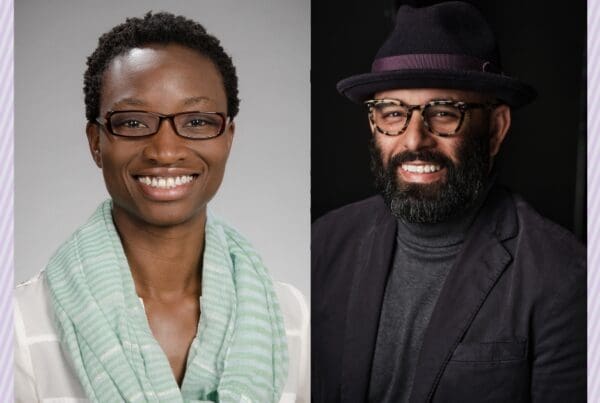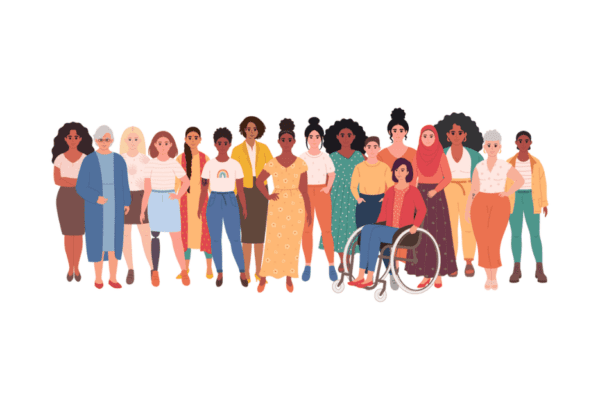Across UW Medicine, employees are championing equity, diversity and inclusion initiatives to grow and support the well-being of our community. From a book club to incorporating an equity lens into critical care curriculum, here is a small snapshot of a day in the life of employee-started initiatives funded by UW Medicine’s Well-Being Grants.
7 a.m. – Employee Health Services, Harborview Medical Center
It is still dark when Valicia Linn, BSN, RN, of Harborview’s Employee Health Services checks the Essentials Market. The market’s shelves hold cans of soup, granola bars, diapers and formula, and menstrual products, among many other items; all of which are complimentary to Harborview employees. There’s also a dedicated resource corner with flyers to make employees aware of the social services support that is available to them.
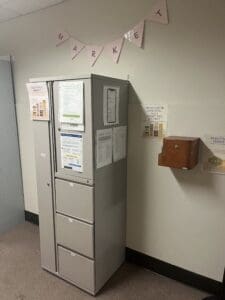
HMC’s Essentials Market
The market was originally started in 2017 by Julianna Musungu, Harborview’s interim director of Environmental Services. Musungu learned that some members of the Harborview community were experiencing food and housing insecurity, and she sought a way to help. Musungu — who today is writing her doctoral dissertation on how to support employees during times of stress using neuroplasticity and Indigenous philosophies — recognized that a pantry of free products might “ease the way” for these employees.
“By supporting others, we become more of a ‘we’ society rather than a ‘me’ society,” says Musungu, “As an Indigenous woman, I believe in ‘we’ as the tribal way of doing things and how we best build healthier communities.”
Today, in partnership with Employee Health Services, the “ease the way” pantry has become the Essentials Market and is open 24/7 to all employees, whether they are having a difficult day, have merely forgotten their lunch or need greater support. Linn, Musungu and colleagues are utilizing grant funding to improve the market’s offerings and to make the space warmer, more welcoming and private.
9 a.m. – Clinical Nutrition, UW Medical Center – Montlake
A few miles away, at UW Medical Center – Montlake, clinical nutrition manager Alysun Deckert, is conferring with dietitians Kaitlen Sandberg, Karissa Culley and Lola Dack as they compile resources for a Food and Nutrition Equity, Diversity and Inclusion (EDI) Book Club. Deckert recognizes that there is a lack of diversity in the field of dietetics, yet the patient population dietitians serve is diverse.
“Food is so closely connected to culture and identity,” says Deckert, “this book club provides our Montlake and Northwest teams with an avenue to have complex conversations in an effort to better support our patients.”
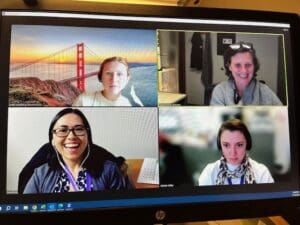
Clinical Nutrition EDI Book Club Committee
The club is currently reading “Year of the Tiger: An Activist’s Life” by disability activist Alice Wong. Deckert and Dack enhance the readings with other elements to extend learning, such as attending a UW lecture by the author, a Spotify playlist and tools on how to be a disability ally.
In the first book club meeting, which is scheduled for January, the EDI Book Club will consider such questions as “how can we adapt our clinical practices to be more inclusive?” and “how could we make holiday meals more accessible?”
As for what’s next, Deckert says, “We are planning to cover a range of topics in our reading including disability rights, weight bias in healthcare and racism in the food system.”
1 p.m. – Pediatric Critical Care Medicine, UW School of Medicine
Over at UW School of Medicine, professors Andrew Koth, MD, Eileen Rhee, MD, and fellow Jessica McDade, MD, are reviewing the curriculum for the next session of Pediatric Critical Care Medicine (PCCM) health equity rounds. They started the PCCM EDI curriculum to increase knowledge within the PCCM fellowship of how inequity impacts critical care and to improve interpersonal bias recognition and reduce its impact on healthcare delivery.
“We can’t achieve improvements in equitable healthcare delivery without making sure we view our health system through an equity lens,” says McDade. “Raising awareness about how the insidious ways we might not realize racism and oppression impact our work systems can allow us to come together to address those injustices.”
This curriculum involves a lecture series within the UW School of Medicine Pediatric Critical Care Division and a lecture series during pediatric critical care fellows’ retreats. Already this year, rounds have included: Severe Asthma and Environmental Inequity, Interpretation in End-of-Life Care and Inequities in Out-of-Hospital Cardiac Arrest.
McDade says, “The creation of safe and inclusive learning environments can help diverse trainees to feel validated and supported in our fellowship program while they train to become pediatric critical care physicians.”
4 p.m. – Pediatric Pulmonary and Sleep Medicine, UW School of Medicine
Not far from McDade’s office, Terri Laguna, MD, prepares for the evening’s #MightyAreTheWomen meeting. Laguna recognized that a high percentage of junior faculty within the Division of Pulmonary and Sleep Medicine at UW School of Medicine needed a space to discuss their professional experiences and lean on the support of the senior female leaders who had gone before them. The creation of a monthly curriculum focused on building leadership and communication skills as well as providing career development advice to help women in academic medicine feel better supported to achieve their goals.
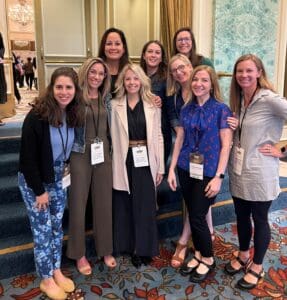
Pediatric Pulmonary and Sleep Medicine #MightyAreTheWomen Meeting
Laguna notes that women in academic medicine face numerous obstacles that may impede their path to promotion and impact their career development and success.
“Broadly, women are paid lower salaries, less likely to receive grant funding, less likely to publish, less likely to be selected for positions of leadership and are less likely to be promoted,” says Laguna, “Additionally, women are often subjected to sexual harassment and misogynistic behaviors throughout their careers that can impede advancement and impact well-being.”
Despite the increased numbers of women entering the field of medicine, particularly in pediatrics, nationally they represent only 21% of full professors and 15% of department chairs. A focus on strategic action, transparent communication and accountability can help reach the goal of gender equity in academic medicine. #MightyAreTheWomen helps provide the mentorship and sponsorship of women throughout their careers, but particularly during the formative junior faculty years.
6 p.m. – Interpreter Services, Harborview Medical Center
Back at Harborview, there is a painting on the wall of the Pat Steel Building. Dozens of flowers in shades of pinks and purples dot the canvas with a blue entwined root — reminiscent of a double helix — connecting the blooms. The art was created at a team retreat of the Interpreter Services Department including interpreters and translators, caseworkers/cultural mediators, schedulers and people from the EthnoMed program (which focuses on advocacy for immigrant communities). The team, which speaks sixteen different languages, supports communication, cultural mediation and cross-cultural education needs for over 16% of Harborview’s patient population, their families and the community.

Interpreter Services Painting
Yvonne Simpson, senior director of Language Access and Cultural Advocacy at UW Medicine, says that interpreters help families and care teams communicate in a meaningful way.
“’We support inclusion with both language access and auxiliary aids or other kinds of tools to help people with vision or hearing difficulties have meaningful communications with their healthcare teams,” says Simpson. “We also bridge the gap between the American medical system and the various linguistic, immigrant and refugee communities we care for.”
Simpson organized the retreat for the team — the first since before the pandemic — to prioritize well-being and reflection time.
“When everyone is at the table, we are more likely to learn many points of view and less likely to leave others behind,” says Simpson. “Our team often works in silos, so to have this ability to connect with one another and build positive relationships is foundational for equity and inclusion.”
From one campus to the next, UW Medicine employees lead inspiring efforts that benefit our community. The projects highlighted here were funded by UW Medicine’s Well-Being Grants. In August 2023, 202 Well-Being grants were awarded with $250,000 in donor funding. The grants support a wide range of projects focused on building community and improving the workplace environment and culture. Learn more about the Well-Being Grants program.

